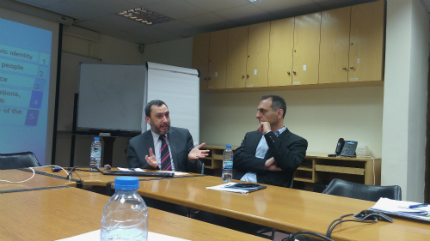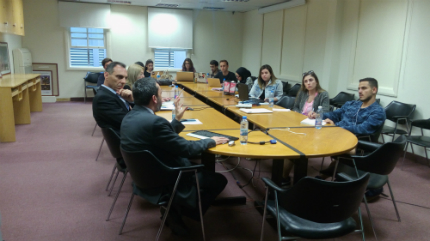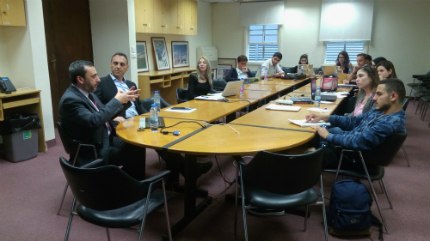ISJCR hosts MP Imad al-Hout
On Tuesday, April 11, 2017, the Institute for Social Justice and Conflict Resolution and the Department of Social Sciences at the Lebanese American University hosted the MP Dr. Imad Al Hout, the representative of the Jama’a Islamiyya at the Lebanese Parliament.
The event was part of Dr. Imad A. Salamey’s senior seminar: Communitarianism and Extremism in Middle Eastern Politics.
Al-Hout discussed the Muslim brotherhood in the context of Political Islam. As a communitarian group, the Muslim Brotherhood.
Al-Hout declared that for the Jama’a “there is no vilayet faqih,” he emphasized that the state is a civil entity and not a religious one
Not a religious state: not governing in the name of Allah and not governed by clerks
Al-Hout clarified the concept of Jihad by arguing that “Jihad is a mean to guarantee peace. Does not aim to aggress another state, rather aims not be aggressed.
Jihad cannot be against its own society; it is only against the external enemy,” and explicitly stated that he is against changing certain Islamic terms because they’ve been understood.

MP al-hout invested quite some time in discussing the definition of political Islam as a “political change movements that believe in Islam as a political system of governance and that Islam is not only a religion but a political, social, legal and economic system that can lead state institutions.” Additionally, political Islam comprises of multiple distinct groups with contradicting interests like Salafism, Sufism and Muslim Brotherhood.
Furthermore, based on Al-Hout, the Muslim brotherhood has a 4-demensions’ methodology of change pertaining to the value, organization, social and state dimensions.
He iterated the Muslim Brotherhood’s vision about MENA crisis contending that the Arab Spring, as he insisted to call it, broke the barrier of fear and made people ready to sacrifice. However, for his excellency, there are three major hurdles in front of the Arab Spring: terrorism, counter revolution and external intervention.

When asked about ISIS, Al-Hout preferred to call them Daesh and not ISIS because they are not an Islamic state. “In their literature, their first enemy is Muslim Brotherhood” because the brotherhood is “a real barrier to people shifting to terrorism: our project is against theirs,” according to him.
Al-Hout assessed the Mohamad Morsi’s presidential mandate in 2012 arguing that the Brotherhood was very inclusive in its rule since the presidential team of 4 members include: a woman, a Copt, a Muslim brotherhood, and a Salafi. Moreover, among the 35 ministers in the government only 5 were members of the Muslim brotherhood.
Furthermore, his excellency iterated the three circles of belonging for an individual: the National circle (love for the land, freedom, dignity and relation; the Nationalism circle (pride of Arabic and Historic affiliation) and the Humanity circle. “We are claiming a new world order on a fair basis” the actual world order Is the result of the second world war,” assured MP al-Hout.

Towards the end, MP al-Hout mentioned 6 probable scenarios for the post-Arab Spring era:
1- “Collapse and chaos (re-fragmentation)
2- Scenario of weak central states (internal conflicts and crisis) but strong enough to protect the borders of occupied Palestine.
3- Reestablishing the regimes before the Arab Spring with new faces.
4- Reconciliations between regimes and peoples and the change movements in an equation of co-participation.
5- A new revolution wave as a result of pressures.”
He posited that the second one is the most active scenario.
Finally, he proposed certain Muslim brotherhood strategies to overcome the challenges. Among these are: strengthening the mainstream civic identity, immunization against intervention and extremism as well as maintaining the positive spirit of the people.